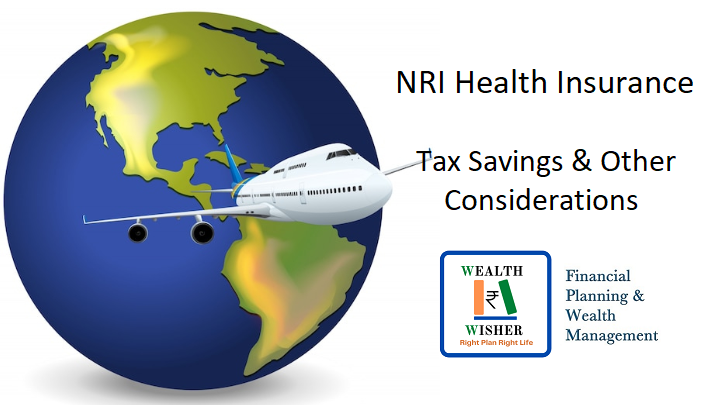Managing finances effectively is essential for everyone, but it’s particularly crucial for Non-Resident Indians (NRIs) who want to optimize tax savings while ensuring financial security. One smart avenue to achieve this is investing in NRIs Health Insurance.
We have already written on the process & the question that NRI should buy health insurance in India and who should take it in the resident country. You can read that post here.
NRIs Health Insurance
Health plans or mediclaim policies as called here, not only offer vital healthcare coverage but also come with attractive tax benefits, making them an appealing choice for NRIs.

In this post, we’ll explore various strategies that NRIs can use to make the most of tax-saving opportunities when buying health insurance policies in India.
Understanding the Tax Saving
To navigate India’s tax regulations related to health insurance premiums successfully, NRIs need a good grasp of the relevant laws.
The Indian Income Tax Act of 1961 allows deductions under Section 80D for premiums paid towards health insurance policies.

Both residents and NRIs can benefit from these deductions, with higher limits applying to senior citizens. This provision provides NRIs with an excellent opportunity to save on taxes while securing healthcare coverage for themselves and their families.
Another savings is the GST amount! Yes NRI can save 18% GST amount payable on the premium as it will avoid double taxation.
GST refund can be claimed when NRI is the proposer and the premium is paid from the NRE a/c.
Policy Features of NRIs Health Insurance
Indian insurers offer a wide range of health insurance plans tailored to the unique requirements of NRIs.
These plans often include flexible features such as coverage for pre-existing conditions, global coverage, and repatriation benefits.
NRIs can use this flexibility to select policies that align with their specific needs, ensuring comprehensive coverage while maximizing tax benefits.
One more shared experience is NRIs sometimes think that since the premium is less in India, the policy or the treatment will be substandard.
This is a myth. The premiums are a function of cost. Medical treatments are less costly compared to other developed countries. So premiums are less. Treatment is as per world standard, otherwise, why will there be rise in medical tourism?
Choosing the Right Mode to Pay Premium
Selecting the appropriate premium payment mode is crucial for NRIs. Options include paying premiums in Indian rupees from Indian bank accounts or through foreign currency remittances.
Opting for payment in Indian rupees simplifies the process and ensures compliance with Indian tax regulations, facilitating the claiming of tax deductions.
NRIs should carefully evaluate these payment options to optimize tax savings. By selecting the right payment mode, NRIs can streamline their tax planning process and maximize benefits.
Maintaining Comprehensive Documentation
Proper documentation is crucial for substantiating tax deductions related to health insurance premiums claimed by NRIs. NRIs should keep copies of policy documents, premium receipts, and bank statements as evidence for tax purposes.
Comprehensive documentation serves as a crucial safeguard in case of an audit or scrutiny by tax authorities, ensuring compliance and mitigating potential issues. By maintaining thorough documentation, NRIs can protect themselves against discrepancies or challenges related to tax deductions.
Coverage of NRIs Health Insurance
It is also important to check coverage. Your Indian health policy may not work abroad. It may only be possible to get a claim when you are in India for treatment. Some policies have global coverage but this coverage may only work in case of emergencies.
Few of this global coverage may be limited also. This means if the claim goes over a certain amount or a certain specific disease is diagnosed, the policy amount can be claimed against Indian treatment only.
There could be other restrictions and exclusions, aside from the fact that health policies with global covers are also expensive.
If you frequently visit India or your parents or family members are in India, a policy for them is a good option. But if you are not visiting India anymore better to go with a policy provider in your resident country.
NRI investors from a few countries are not allowed to buy health insurance from India. Mostly NRIs living in FATF-classified (Financial Action Task Force) Countries or countries involved in wars or money laundering are denied health policy in India.
In conclusion, NRIs can maximize tax benefits by investing in NRIs Health Insurance plans in India. Understanding tax regulations, strategically selecting insurance policies, staying informed about tax laws, and maintaining comprehensive documentation are key to optimizing tax savings while securing essential health coverage for themselves and their families.
Integrating health insurance into financial planning empowers NRIs to achieve fiscal efficiency and peace of mind in managing healthcare expenses. By leveraging tax-saving opportunities effectively, NRIs can secure their financial future while ensuring access to quality healthcare services in India.








